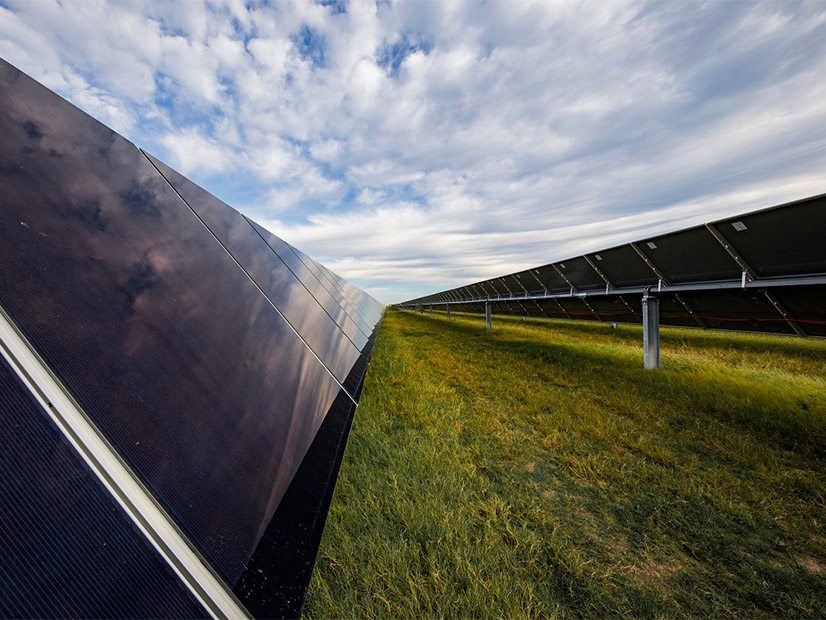Midwestern parties need to act with more urgency to open wholesale markets to DER aggregation, panelists said during the annual meeting of the Midwest chapter of the Energy Bar Association.
Joann Stevenson Worthington, senior manager of regulatory affairs at Voltus, said DER contributions aren’t as new as some may think. She said FERC Order 2222 was “acknowledging that it was happening and really trying to put some structure around it.”
“The regulations are behind and continue to be behind what’s happening on the ground,” Stevenson Worthington said during the Nov. 6 meeting.
She also said FERC “seems inclined not to give people a lot of time to get their ducks in a row” on compliance.
FERC last month rejected MISO’s proposed 2030 go-live date to bring DER aggregations into its markets. The commission told the grid operator to pick a closer date and explore the possibility of aggregations spanning multiple pricing nodes. (See FERC: MISO’s 2030 Finish Date on Order 2222 Compliance not Soon Enough.)
So far, Stevenson Worthington said she’s observed “piecemeal” responses from states on aggregator participation, driven largely by their regulated utilities approaching them about cost recovery and tariffs. She said she’s concerned that state commissions and RTOs won’t reach the level of cooperation required to successfully implement Order 2222.
Stevenson Worthington said Order 2222 issues need to be “grappled with in the shorter term instead of the longer term” and that it behooves states to work out rule sets now. She said she felt “horrible” telling states that because she knows they’re working with limited funds and resources and often focused on “putting out other fires.” However, she said states and grid operators continuing to work in their own “siloed” processes isn’t practical.
“I think this will require a greater deal of coordination than at current,” she said. She added that full DER aggregator implementation in the wholesale markets will pay off through lower prices for customers.
Ameren Illinois Senior Manager of Regulatory Compliance Peter Millburg said states, utilities, aggregators and grid operators need to arrive at a process that works for everyone — and quickly.
“It’s here. Aggregation is already here, and it’s at scale. … We already purchase capacity from it,” Millburg said. “Right now, it’s a really manual process, and that needs to change.”
Millburg called for a “dynamic, real-time” solution. He said utilities and grid operators need to move from simply making sure load is served to understanding how to maximize dispatch of the system. He also said asking utilities to hand over data and let a third-party aggregator handle every aspect of the process is a “nonstarter” due to cybersecurity concerns.
Millburg said despite vendors’ claims, fully functioning distributed energy resource management systems don’t exist yet, though they should.
Millburg advised everyone to “remove fear.” He said he understands aggregation participation is a new concept, and reliable service is paramount, but that the two aren’t mutually exclusive.
“These are known products; these are existing products. … Keep in mind that it’s not just generation; it’s also demand,” he said.
Steve Davies, IURC’s senior assistant general counsel, said IURC has been holding public meetings on Order 2222 and gathering opinions for nearly a year.
Davies said Indiana might start a docket on the rule or institute its own state rulemaking on allowing DER aggregator participation.
He urged other states to get started as early as possible collecting suggestions and thinking about what rule changes they will need.
“We’ve been doing this for almost a year now … and I feel like I’m just starting to get my head around this,” Davies said.
MISO said it will seek an extension with FERC to hold up to six months’ worth of additional discussions with stakeholders before proposing a new Order 2222 implementation date and deciding whether it can handle multinodal aggregations.
MISO said it will handle FERC’s other, less intensive asks in a filing within 60 days.
MISO’s plan to devote more time to Order 2222 coincides with it extending its DER Task Force through 2024. The RTO originally considered sunsetting the task force this year.


